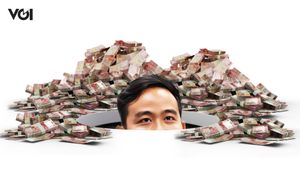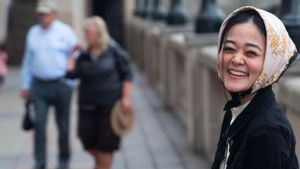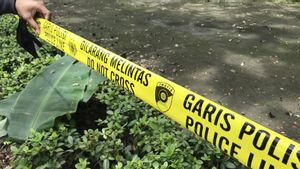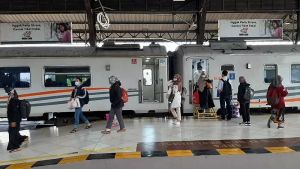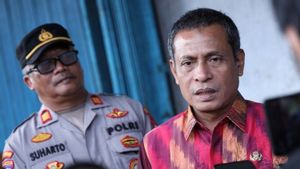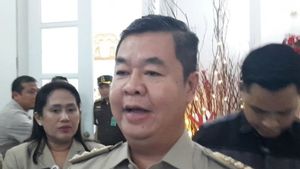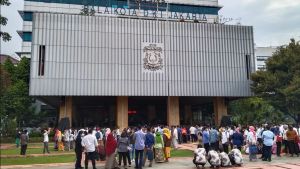This week the public was presented with the emergence of tubi as a result of a political survey from survey institutions, which held electability of presidential candidates. Although the numbers reported by the survey agency are different. However, the trend seen by the Prabowo - Gibran pair is temporarily superior to the Ganjar-Mahfud pair, which in previous surveys was favored, as well as the Anies-Imin pair.
According to Burhanudin Muhtadi from Indonesian Political Indicators, this constellation change was surprising, his agency survey conducted the period from October to early November through three ways via telephone and face-to-face results were obtained more or less the same. "Initially, after registration, our presidential candidates suspected that the votes of the Prabowo-Gibran pair would decrease, seeing negative sentiment on social media after the Constitutional Court's decision. But it was not proven empirically. In fact, Jokowi's supporters were massively exodus from Ganjar to Prabowo's pair," said Burhanudin when presenting the results of his survey on TVONE.
Information on the electability of candidate pairs that the survey institute continues to report is information and guides for voters to agree with their choices. The public opinion survey is one of the instruments or tools for reading people's desires, hopes, and support and even community disappointment accurately in political competitions. The public opinion survey is also useful for understanding the demands, assessments and satisfaction of the public on various political issues in society.
In developed democracy, surveys have become a tradition, especially in America, the habit of conducting political surveys since 1940 has been carried out. Methods and implementation techniques from time to time continue to grow. In Indonesia, the tradition of surveying public opinion has developed since the reform era and especially the implementation of direct elections in 2004. Since then a number of survey institutions have emerged, some even implementing quick count or quick count.
The Indonesian Institute released an article that reviewed the benefits of survey implementation. The survey is considered to have significance related to Indonesia's political map ahead of the 2024 election. The survey results are considered scientific products, so they have legitimacy. The survey results are also trusted because they can be accounted for.
SEE ALSO:
Surveys are useful for increasing awareness of candidates related to popularity and electability. Survey results can be information for political parties in the candidate selection process, both legislative and presidential. Survey results can also form public opinion and bring up a bandwagon effect' meaning that candidates with high surveys form public opinion that these candidates can win elections. Voters who initially had not made a choice with surveys and publications were encouraged to make their choices.
However, although surveys are important, surveys also have the potential to cause a number of problems. It becomes a problem when the survey is an order and published to the public. It is feared that the survey results are only used to lead public opinion or thwart political opponents. Until it takes the role of an organization or association that belongs to survey institutions to tighten the code of ethics of the institution, or ensure that regulations are obeyed.
Another problem, if the survey results show a very narrow victory, so that it is prone to mistakes. Or there are conflicting results. So that it has an impact, conflicts between candidates and their supporters.
As in the 2014 presidential election case (Pilpres), where there was a polemic of quick calculation results (quick count). Where 8 surveys were recorded in Litbang Kompas, RRI, SMRC, CSIS-Cyrus, LSI, IPI, Poltracking Institute, Populi Center won the pair number 2 Jokowi -Jusuf Kalla. While four (4) surveys, namely Puskaptis, JSI, LSN, and IRC won pair number 1: Prabowo-Hatta. The second result claimed the same victory.
The quick count results, which were originally expected to help the public obtain information, actually resulted in a split. The mass mobilization of supporters that threatens unity. Although they realize that the quick count results are not the official result of a vote count.
Political research institutions often face issues of independence and ethical dilemmas. In order for institutional dignity and research results to be maintained, survey institutions need to clarify their status as survey institutions or as political consultations and successful teams. However, in Indonesia this condition often mixes with research institutions and consultants. There must be an institution trying to separate consultants and research institutions. but because it is managed by the same person. The public often doubts independence.
Reflecting on this case, there was pressure from many parties to regulate and limit election surveys with special rules and laws regarding the implementation of surveys and polls. They initially wanted regulations and laws on separate election surveys to be made.
However, recently the DPR has only inserted rules regarding surveys, especially quick count in the Election Law without making a survey Law. In the Election Law, especially Chapter XVII for Community Participation, Article 449, Election Law No. 7 of 2017, it was stated there in addition to declaring a survey and calculating it legally quickly. Also regulates restrictions and sanctions as well as survey restrictions.
Sebagai misal survei tidak boleh dilakukan di masa tenang. Pelaksanaan pencaluman cepat hasil Pemilu wajib mendaftarkan ke KPU. Selain itu pengumuman hasil count cepat diperbolehkan paling cepat 2 jam setelah penuhian. Kalumun cepat juga wajib memberitahui sumber dana dan methodologi yang digunakan.
The regulation is followed by KPU Regulation No. 9 of 2022 concerning Community Participation where registration as a survey institution is carried out 30 days before voting day in both districts and provinces. Survey institutions that have carried out quick calculations are required to report the results 15 days after the implementation. With the report of the source of funds with a public accounting audit, reporting the methodology used, the number of respondents and their samples, the date of implementation, the region and the results of the Survey or quick calculations.
Commissioner Idham Holik told reporters that he would tighten the implementation of the quick count of the 2024 presidential election. "It can only be carried out quickly after 2 hours after the calculation ends. Those who violate these provisions are threatened with imprisonment for 1 year and 6 months, as well as fines," said Idham. Based on KPU data, it is known that the number of survey institutions registered at the KPU reaches 56 institutions. Some of them or 42 institutions are institutions that can hold quick calculations.
Opening The Origin Of Survey Funding
Survey institutions are often not open where their funds come from. So they are often suspected of being independent when conducting surveys. Apart from conducting surveys, they sometimes ask as consultants to obtain funding from clients for their consulting work.
Indo Barometer Executive Director M Qodari had said that the funding of his institution came from everywhere. According to him, as a private survey agency, the survey agency obtained funds from other parties as part of a cooperation contract to conduct a survey. Qodari added that if the survey was conducted in cooperation with political parties, the funds would come from the political party concerned. If it is carried out related to the regional election, the regional head candidate who finances the survey is concerned. "Likewise, if the survey is conducted to find out the government's performance, the survey costs will come from the agency or government department." he told reporters some time ago,
The Indonesian Survey Institute (LSI), Cirus Surveyors Group, the Information Research Institute (LRI), and Indonesian Research Services (JRI) also provided their source of funds. Their source of research activities is admitted from the foundation where they conducted a commercial survey. "This operational margin is used to support LSI. In addition, there are many (sourced funds) from companies and political parties," said LSI Director Saiful Mujani at the time.
So how much does a contestant have to spend to be able to conduct a survey. According to Soeyanto, Consultant Director from Citra Indonesia, said there was no definite price benchmark for the survey. That's usually an agreement between clients and consultants. Usually clients are creative and believe in the survey agency.
But usually for regional head candidates in a district they pay Rp 115 million to 125 million. But that is sometimes offered as low as possible. But I make sure the figure cannot be less than Rp 80 million. "It is certain that people cannot conduct surveys with a capital of less than Rp 80 million". According to Soeyanto, sometimes there are survey insurgents who offer, lower. There is even a state university accepting a survey with a cost of only 25 million. "I say that's abal survey, whose data while calling the quasioner material is filled under a tree, "he said in a video show.
He also turned off to complete the survey took 3 weeks. Training takes 4 to 7 days, 10 days to go to the field, and 4 days of data processing. sometimes clients want it to be faster than that. It could be accelerated, with acceleration, but no later than 15 -21 the fastest day can be finished.
How about the presidential candidate contestants and how much the funds must be provided for one survey. According to Philip J Vermonte, Chairman of the Indonesian Public Opinion Survey Association (Persepi) for once a survey is needed at least Rp 500-700 million for. Meanwhile, Andalas University political observer Asrinaldi said that to conduct a one-time presidential election survey, Rp 500 million to Rp 1 billion was needed.
Surokim, in the Research of Public Opinions in the Political Industry, said that the problem of funding is the first root of the problem for survey institutions, especially for institutions that are not yet established financially and rely on funding only from surveys. Financially unstrong survey institutions are easy to be tempted to spread survey results.
Survey results can sometimes be changed and benefit certain parties and can adjust the interests of those who donate funding. This is where the root of the independence problem arises. This is usually faced by new survey institutions that do not yet have sufficient funding diversification for survey administration. The idealism often collapses due to the lure of funding support.
"The code of ethics of research or survey of public opinion in a position like this is very important. The code of ethics will be the bulwark of idealism for survey institutions to face ethical dilemmas," he said.
The English, Chinese, Japanese, Arabic, and French versions are automatically generated by the AI. So there may still be inaccuracies in translating, please always see Indonesian as our main language. (system supported by DigitalSiber.id)



